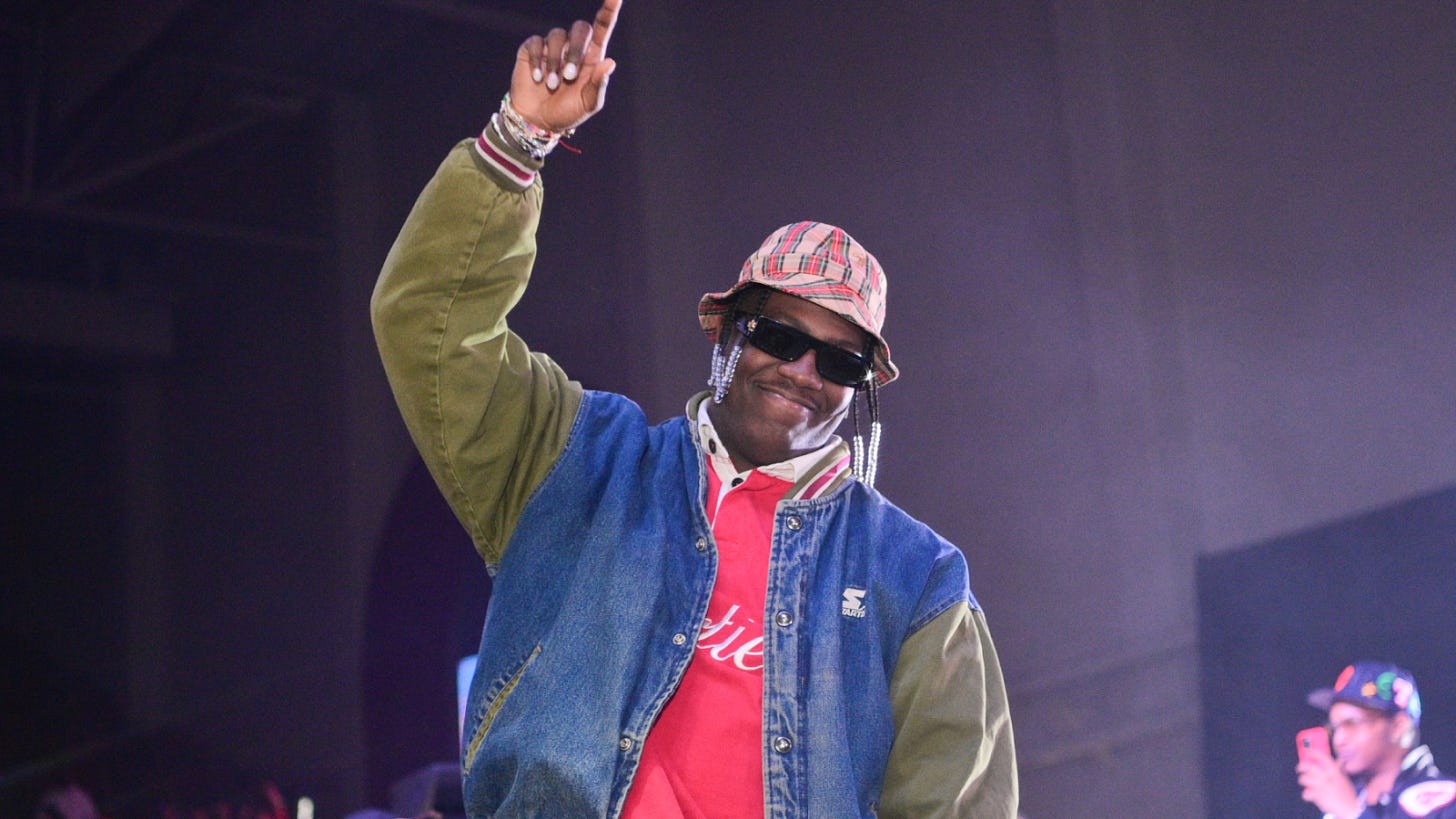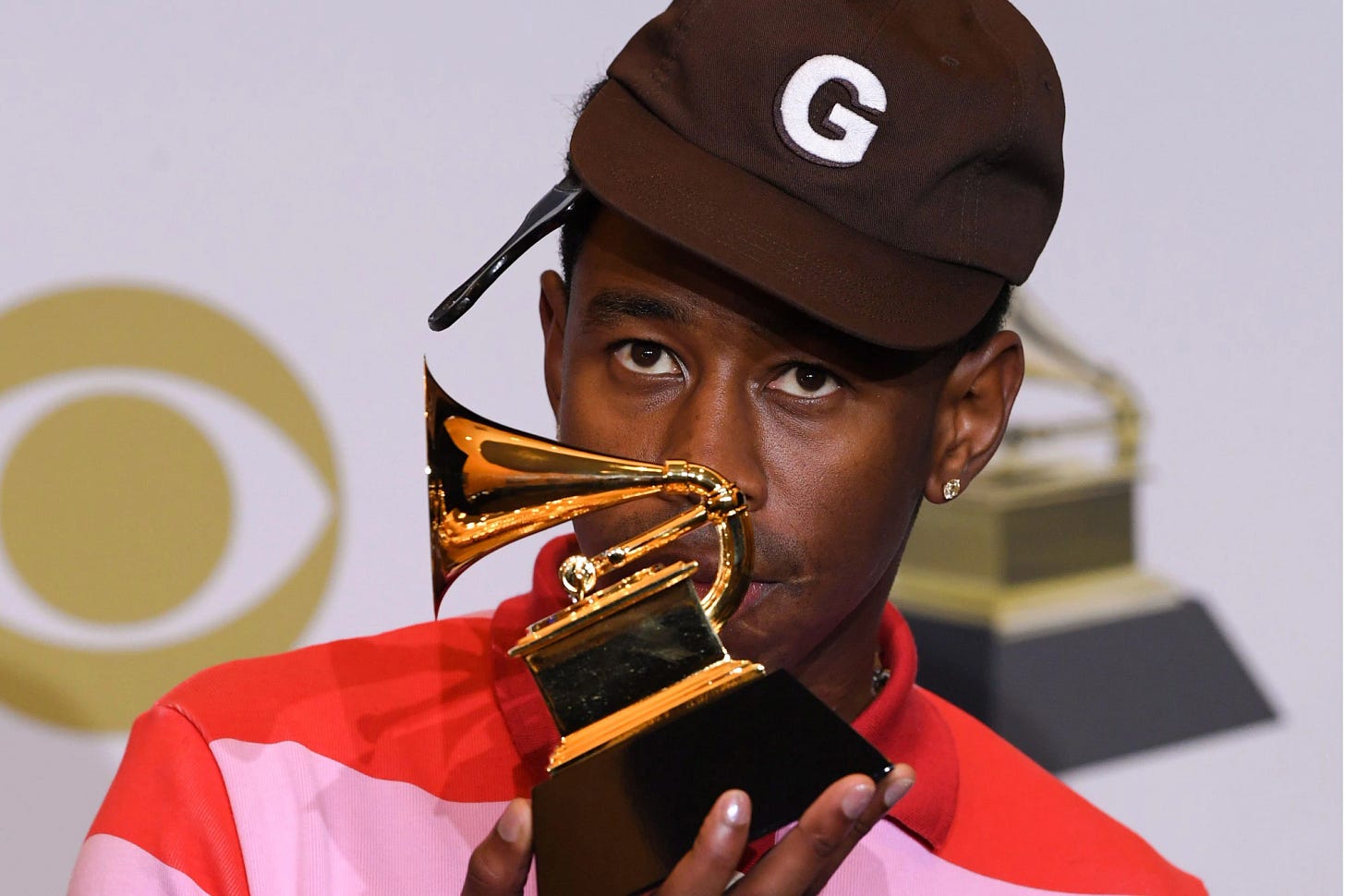Black artists are getting recognition for the wrong reasons
What Lil Yachty's "Let's Start Here" says about Black artists in alternative spaces.
It’s been about two weeks since Lil Yachty’s fifth studio album Let’s Start Here arrived for public consumption. And in those 14 days, I found myself enjoying the project quite a bit. Songs like “The Black Seminole”, “Pretty”, and “Drive Me Crazy” have entered my rotation, with their funky psychedelic rock influences. You can tell that Yachty was doing his best to carve a new niche for himself with this project, a niche in the alternative space.
Lil Yachty’s career up to this point has been a prolific one. From 2016 through 2022, Yachty released four studio albums, four mixtapes, nine EPs, and around two dozen features (which is formally known as a hell of a lot of music). And while primarily a rap artist, Yachty hasn’t shied away from experimentation and has changed his sound quite a bit from his Soundcloud years to now. What once could be described as “bubblegum rap” has evolved and become a robust catalogue featuring pop cuts, gritty Atlanta soundscapes, and even the lyrical adeptness of the Detroit scene. All of that to say, Yachty is good. So his foray into the alternative space should be as well received as the ones before it… right?
Well, that’s the thing. It was received very positively. The album was acclaimed by critics and fans alike.


However, I’m not particularly interested in the “quality” of the album, but rather in the discourse around Lil Yachty’s discography sparked by this album’s release. Let’s Start Here’s acclaim and inventiveness were being used to diminish his earlier work, work that consists mainly of rap and hip-hop cuts.

Opinions about something as subjective as music taste are valid, but there seems to be more at play here. A little context. In a 2016 interview, The Guardian referred to Yachty’s songwriting style as “fun, hook-first pop rap oblivious to songcraft and structure that doesn’t take itself too seriously.” Worse, it continues with a presumptuous statement that seemed to question his ethic, claiming his music has “very little interest in legacy and even less in rap canon.” Yikes. At best, backhanded compliments about his ability to make purely feel-good music. At worst? A reduction of Lil Yachty’s work to least common denominator pop-rap and a dismissal of his understanding of rap and hip-hop as art. Despite his sustained success, Yachty definitely feels this, being upfront about how his shift in tone is linked to his desire to be held in higher regard by the masses.
I’m fine with the idea that this album was meaningful to Lil Yachty, and that he considers it to be his best thus far, as I would hope that as one continues throughout their career, they continue to make things that push their limitations and comfort zones. However, what gives me pause is how Yachty’s thoughts on his place in music give credence to those who refuse to respect his young artistry.
To me, it seems that praise of Let’s Start Here has come at the expense of Yachty’s hip-hop roots. Psychedelic rock’s artistic validity over hip-hop is being cemented through dismissive and condescending comments made by critics, fans, and Lil Yachty himself.
This isn’t an issue exclusive to Yachty. Many Black artists who exist under the hip-hop umbrella aren’t given the recognition they deserve until they foray into fusions or genres that are accepted to be “art” by the more mainstream (more white) listener. Kendrick Lamar’s To Pimp A Butterfly’s jazz fusion was seen as revolutionary lyrically and sonically. Tyler, the Creator’s Igor had a heavy neo-soul feel, funk influences, and critical acclaim, earning him his first Grammy through his then 12-year career. Similarly, Donald Glover’s first Grammy award came in 2018, but not for any of the rap cuts from the past 7 years. He won in the category Best Traditional R&B Performance, for the song Redbone on Awaken My Love!, his first head-first dive into R&B.
Interestingly, one might raise the point that jazz, funk, and R&B are historically Black genres. Might these artists just be paying homage to the James Browns and Al Greens of the world? Perhaps. Although I don’t think that makes the racial component of this issue any less potent. Hip-hop is uniquely situated in a place that makes it hard for groups to co-opt. Historically, at its best rap and hip-hop speak to a struggle specific to marginalized communities and the aesthetics of the genre reflect that as well. While jazz, funk, and R&B are marked sonically, hip-hop as a “genre” is identified by the lyrical content.
Lil Yachty’s case is a bit more straightforward. Contemporary psychedelic music, rock in particular, has been a majority caucasian enterprise. Bands like King Gizzard and the Lizard Wizard, Animal Collective, and Tame Impala have been driving forces in the genre for the past decade, with their sounds being described as experimental and alternative. These groups help illuminate the issue with the discourse around Let’s Start Here. Tame Impala’s latest album The Slow Rush was released in early 2020, to similar acclaim, yet the internet’s reaction to that album pales in comparison to the reaction to Yachty’s attempt at a psychedelic album.
So what this signals to me is a pattern of recognition for genre subversion. There’s a clear incentive for dismissing hip-hop. For some reason, just co-opting the “alternative” label legitimizes the music and moves it into a separate category of art. But why should talented hip-hop artists have to leave their spaces to receive the acclaim they’ve deserved for years prior?
Not sure. They shouldn’t.
And for clarity, I’m not saying these artists shouldn’t be subversive, shouldn’t create outside their main genre/ comfort zone, or shouldn’t make certain types of art. I’m saying they shouldn’t feel like they have to. I believe these artists can (and do) make great music and the implicit biases of the music industry shouldn’t be the deciding factor for creatives deciding how to realize their ideas. Lil Yachty, a highly influential, 25-year-old, Grammy-nominated, genre-bending musician, feeling disrespected by his industry speaks to a bigger problem, where art is ranked by a supposed “intrinsic value”, which in turn values certain genres and styles above others. And when rap and hip-hop consistently appear at the bottom of these rankings, it will disproportionately affect Black artists and artists of other marginalized groups who have historically used hip-hop as their outlet.
The only way to overcome this is for the music industry, musicians, critics, and consumers to examine why they think what they think about music. If Yachty has the album of the year, it should be because it’s better than the rest of the albums that year, not “better” or different from the music he’s released previously. I hope from this point on, Yachty continues to push the boundaries of his style and sound, except this time, with the respect he deserves.
happy black history month!






Great read 😤
Well done my friend 🤝🏾